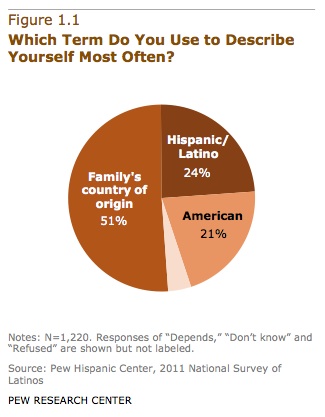04/05/2012

The new Pew study of identity among the 50 million Hispanics in America is quite revealing, perhaps more than was intended.
The takeaway point is that Hispanics come for the money and don’t identify as Americans but with their tribe of national origin (see graph).
Hispanics believe that they should “learn English in order to succeed in the U.S.” (as Newt Gingrich promotes) but not as a way to become part of the American national community.
A majority admit they came for the money, specifically, “When asked why they came to this country, more than half (55%) of immigrant Hispanics say it was for economic reasons, while 24% say it was for family reasons.” The “better life” mantra we hear from “immigrants” doesn’t mean they desire more freedom or educational opportunity — the purpose is acquiring the Yankee dollar, period.
Another fascinating item is Hispanics’ high opinion of themselves (as noted in Pew’s Executive Summary):
Hispanics say their group has been at least as successful as other minority groups in the U.S. Most Hispanics (55%) say their group is about as successful as other racial and ethnic minority groups in the U.S. More than one-in-five (22%) say they have been less successful, while 17% say they have been more successful.
The persons polled must not mean educational level, since Hispanics are uninterested in pursuing education. While 50 percent of Asians have a bachelor’s degree or better, about half of Hispanics drop out of high school and only 13 percent have a college degree.
Furthermore, on a list of incomes by ethnic group in the United States based on 2010 Census data, Hispanics rank near the bottom, #27 out of 29. The US average income is $51,222, while the Hispanic number is $40,914.
But it’s nice that Hispanics have high self-esteem about their diversity.
Following is the start of the Executive Summary. You can read the entire report online.
When Labels Don’t Fit: Hispanics and Their Views of Identity, Pew Hispanic, April 4, 2012
I. EXECUTIVE SUMMARY
Nearly four decades after the United States government mandated the use of the terms “Hispanic” or “Latino” to categorize Americans who trace their roots to Spanish-speaking countries, a new nationwide survey of Hispanic adults finds that these terms still haven’t been fully embraced by Hispanics themselves. A majority (51%) say they most often identify themselves by their family’s country of origin; just 24% say they prefer a pan-ethnic label.
Moreover, by a ratio of more than two-to-one (69% versus 29%), survey respondents say that the more than 50 million Latinos in the U.S. have many different cultures rather than a common culture. Respondents do, however, express a strong, shared connection to the Spanish language. More than eight-in-ten (82%) Latino adults say they speak Spanish, and nearly all (95%) say it is important for future generations to continue to do so.
Hispanics are also divided over how much of a common identity they share with other Americans. About half (47%) say they consider themselves to be very different from the typical American. And just one-in-five (21%) say they use the term “American” most often to describe their identity. On these two measures, U.S.-born Hispanics (who now make up 48% of Hispanic adults in the country) express a stronger sense of affinity with other Americans and America than do immigrant Hispanics.
The survey finds that, regardless of where they were born, large majorities of Latinos say that life in the U.S. is better than in their family’s country of origin. Also, nearly nine-in-ten (87%) say it is important for immigrant Hispanics to learn English in order to succeed in the U.S.
This report explores Latinos’ attitudes about their identity; their language usage patterns; their core values; and their views about the U.S. and their families’ country of origin. It is based on findings from a national bilingual survey of 1,220 Hispanic adults conducted Nov. 9 through Dec. 7, 2011, by the Pew Hispanic Center, a project of the Pew Research Center. For a full description of the survey methodology, see Appendix A. (In this report, as in all Center reports, the terms “Hispanic” and “Latino” are used interchangeably).
This is a content archive of VDARE.com, which Letitia James forced off of the Internet using lawfare.